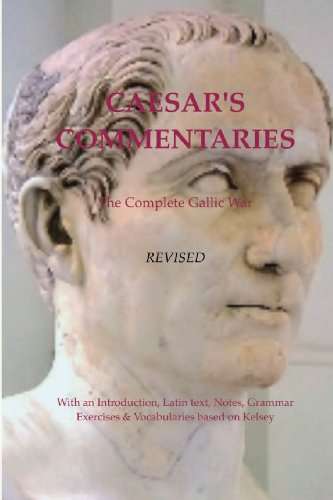Caesar's Commentaries. The Complete Gallic Wars. Revised.: Revised Edition
Published by Sophron, 2012, softcover, 508 pages, index, condition\: as new.
The most complete Latin/English edition of Caesar's Commentaries ever published. All based on Francis Kelsey's editions. An extensively annotated Latin text; Introduction to the study of Caesar; 17 maps of the campaigns and battles, illustrations; A complete grammar section and an historical companion with historical and background notes, both keyed to the text; Site reading and writing exercises;
Conquering Gaul was a challenge, even for a general as able as Julius Caesar. Writing about it in just the right way, so as to persuade a divided Roman people that he was the leader Rome needed, was a challenge of its own. But if ever there was a man who welcomed a challenge, that man was Julius Caesar; and this edition of The Conquest of Gaul reveals much about Caesar as politician, general, author, and human being. Caesar had good reason to want to tell his own story of fighting the Gauls in modern France; his enemies in Rome resented his growing power, and the book that was known in its own time and place as Commentarii de Bello Gallico gave Caesar a chance to get his own version of events before the people of Rome. The book therefore worked for Caesar as radio and television and Twitter have worked for some American presidents; it gave Caesar a way to reach the Roman people in a direct, unmediated manner by using the latest communications technology. Julius Caesar was not the first classical writer to adopt the expedient of describing his own actions in the third person, to give his account of his own actions a false air of objectivity; the Athenian writer Xenophon had done the same thing in his Anabasis (The March Up Country). But if Xenophon pioneered that technique, Caesar made it his own.
It will surprise no one that Caesar chronicles these events in a way that is, well, favourable to Caesar. When, for example, Caesar treats of the reluctance of some of his men to engage the numerically superior forces of the Germanic chieftain Ariovistus, for example, he describes how he upbraided the soldiers for cowardice, and added that those who tried to disguise their cowardice by pretending to be anxious about the corn supply or the difficulties of the routeeither lacked confidence in their generals sense of duty or else meant to dictate to him (p. 51). Caesar further declared that, if necessary, he would face Ariovistus alone, with only the 10th Legion as a glorified bodyguard. Caesar tells us that This address had a dramatic effect on all ranks, and inspired them with the utmost enthusiasm and eagerness for action (p. 52). Problem solved! Yay!

